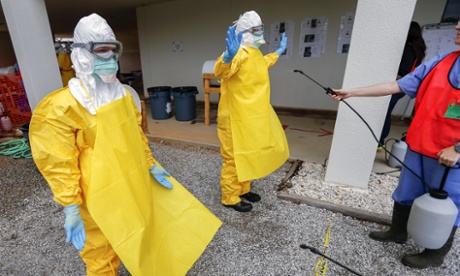
The operator of the Texan hospital in which two nurses contracted Ebola has apologised for initially failing to diagnose the patient who infected them, and for misinforming the public about how this happened.
Dr Daniel Varga, chief clinical officer at Texas Health Resources, conceded that errors were made by Presbyterian hospital in Dallas, which sent Thomas Eric Duncan home after he complained of a fever and abdominal pain after arriving from his native Liberia last month.
“Unfortunately, in our initial treatment of Mr Duncan, despite our best intentions and highly skilled medical team, we made mistakes,” Varga wrote in testimony to the US Congress. “We did not correctly diagnose his symptoms as those of Ebola. We are deeply sorry”.
Duncan died on 8 October, a week after he became the first person diagnosed with Ebola in the US, and two weeks since he first sought treatment at the hospital’s A&E department. Two nurses involved in his care – Nina Pham, 26, and Amber Vinson, 29 – have since been diagnosed with the virus, raising serious questions about the hospital’s procedures.
Texas Health initially explained its failure to diagnose Duncan, who did not have health insurance, by saying that a nurse had not shared the patient’s travel records with a doctor. However, it has subsequently retracted this statement.
The Centers for Disease Control and Prevention (CDC) had advised hospitals to consider Ebola when diagnosing people suffering from a fever after travelling to countries affected by the outbreak.
Later, the hospital operator said Duncan’s ability to pay had no impact on his treatment, adding that the patient had been cared for and prescribed antibiotics. Duncan returned to the hospital in an ambulance three days later and eventually died in an isolation unit.
Varga wrote in his testimony: “In our effort to communicate to the public quickly and transparently, we inadvertently provided some information that was inaccurate and had to be corrected.” He conceded that this had been “unsettling to a community that was already concerned and confused”.
The doctor, a senior executive vice president for the hospital operator, said he and his colleagues “don’t yet know precisely how or when” Pham was infected with Ebola as she was “using full protective measures under CDC protocols”.
The National Nurses United union criticised Texas Health for Duncan’s care after medical records suggested staff worked in the quarantine unit with their skin exposed during the three days between when the patient was admitted and when he was diagnosed. They alleged other failings in protective clothing and the isolation of Duncan.
“Were protocols breached? The nurses say there were no protocols,” the union’s co-president, Deborah Burger, said.
The 77 healthcare workers believed to have worked in the quarantine room with Duncan or handled samples of his blood are being monitored for symptoms. Varga said in his testimony the staff had been separated into three categories based on how at-risk they were. Those at highest risk have been told to stay off work and not use public transport. They are required to remain in the county where they live, Varga said.
In his written testimony to the subcommittee, before a hearing on Thursday, the CDC director, Dr Thomas Frieden, said the nurses’ infections “demonstrate the need to strengthen the procedures for infection-control protocols which allowed for exposure to the virus”.
It emerged on Wednesday that after suffering a fever, Vinson had asked the CDC whether she should take a flight on 13 October to Ohio, where she was to spend time with family. She had been told to proceed because her temperature of 99.5F (37.5C) fell below the CDC threshold of 100.4F.
CDC officials have since acknowledged that she should not have flown on a commercial plane.
Frieden, however, sought to allay public fears over the virus. He said he and his colleagues “remain confident that Ebola is not a significant public health threat to the United States” due primarily to the virus not being easily transmitted.
Varga, who gave no update about Vinson’s condition, said: “Our thoughts and prayers are with her and her family as well”.
